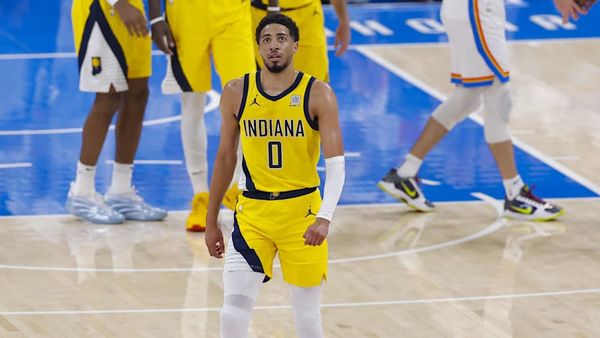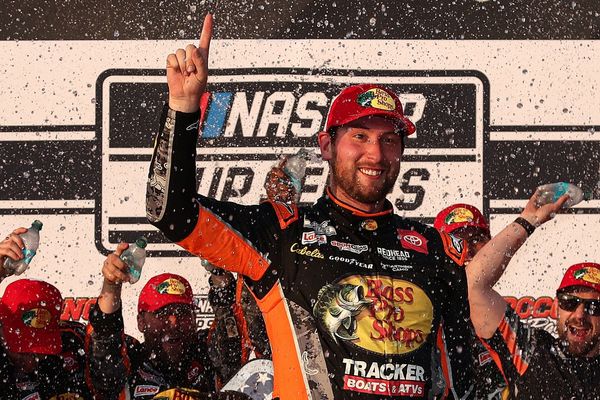
Interviewing one of the contenders for Sports Personality of the Year last night on BBC1, co-presenter Gabby Logan observed that “it’s not how you start, it’s how you finish that counts”.
This coaching advice applied to the programme itself, which began with an unfortunate technical cock-up: the clock that counts down to the opening titles – intended to be seen only by the crew in the studio gallery – was inadvertently broadcast live to a national audience at the end of Countryfile. This was soon followed by Gary Lineker, sharing hosting duties in Belfast with Logan and Clare Balding, announcing that he had cut himself while carrying the Spoty trophy on to the stage and was “bleeding everywhere”.
Although ultimately his comment proved barely a contender for the title of Most Hyperbolic Statement of the Night, Lineker may have been exaggerating slightly – he survived to complete the two-hour broadcast with a discreet plaster on his thumb.
With this unfortunate start over, the show was free to focus on building towards the announcement of the main prize, which always overshadows proceedings. This was true more than ever because of the presence among the dozen competing for the main prize of Tyson Fury, the world heavyweight boxing champion, who has made public comments that were widely considered misogynistic and homophobic.
The BBC had resisted calls – from commentators and its own staff – to remove Fury from the shortlist, so there was fascination surrounding the tactics it would employ to deal with the dinosaur in the room and – if he finished in the top three of the public vote – on the podium.
Although the 12 contenders were listed alphabetically in the shows’s onscreen graphics, with Fury fourth, between Mo Farah and Chris Froome, the mini profiles dotted throughout the show began with Greg Rutherford, which meant that the Fury biography could turn up at any time – or possibly not at all. Would the BBC omit to screen it, claiming that Lineker’s blood had accidentally corrupted the tape?
Since each of Fury’s rivals seemed to have a celebrity endorser – David Beckham for England footballer Lucy Bronze, John McEnroe for Andy Murray – there was an additional source of tension: who, apart from the ghost of Bernard Manning, might agree to big up the boxer? In the event, the film about Fury was fronted by the man himself, a solution that eloquently suggested his isolation from the other athletes.
There was still the problem of the live, onstage interview that followed each promotional film. Having doubtless discussed the possibility of asking the boxer to talk to himself, the producers delegated the task to Lineker, the only member of the presenting trio who did not belong to a group previously denigrated by Fury.
The BBC is so riddled with management meetings that it would be surprising if there had not been several to discuss how the dinosaur’s roars would be broached. Viewers of Match of the Day feared that Lineker would resort to one of his signature wordplay riffs: “Now we have Fury on stage, which means even more fury in the audience. Why do boxers called Tyson have so much trouble with women?”
Thankfully, his questions were pun-free. Just as problematically, however, the favoured solution seemed to be to allude to the unpleasantness in the manner that nuclear war is referred to as “the event” in a series of Mitchell & Webb sketches set in a post-apocalyptic society.
“Shall we start with the fight?” said Lineker, the emphasis setting up interviewee and audience for the ideological right hook that would follow. But, when it came, the punch was pulled. “Since the fight, there has been something of a fallout,” he said. “Looking back on that now, what are your reflections?”
Clearly uncomfortable with asking the question, Lineker had swallowed his words slightly, which may have been what led Fury to check: “Say that again?” Realising that the most fearsome fighter in the world had just asked him, in effect, to come here and say that again, Lineker sounded even more uncertain as he parried: “What are your reflections, looking back at the fallout that has followed the fight?” Leaning forward, Fury blocked again: “Er, with?”
I wondered, as Lineker must surely have done, if the boxer was trying to make the presenter repeat the contentious phrases. “Er, with some of the things you possibly said?” Lineker managed to ask. Fury finally gave the response he and his trainers had prepared, acknowledging that he had said a lot of stuff, but never with the intention of hurting anyone.
The obvious risk of this approach, for the BBC, was that viewers who hadn’t followed the controversy closely heard the apology without knowing what it was for, which might have increased Fury’s vote, raising the possibility of him winning the contest. Luckily, the winner was a sports star who has only offended some England football fans and the occasional stuffier sportswriter – Andy Murray.
At least Fury’s presence added some edge to a programme that was otherwise prone to hysteria, especially in its self-congratulatory glee about the regional inclusivity of the BBC evinced by bringing the show to Belfast. The presenters kept yelling, “It’s great to be here in Northern Ireland!”, while a BBC judging panel decided – conveniently – that the coach of the year, against strong competition, was Michael O’Neill, boss of the Northern Ireland football team.
There was also an odd emphasis on the family credentials of the contestants. With Rutherford, Ennis-Hill and Farah quizzed about recently becoming parents, and Murray about impending fatherhood, it seemed sometimes that the title up for grabs was actually Sports Procreator of the Year. Luckily, no one asked Fury about the ideal role for women in society.







